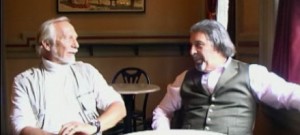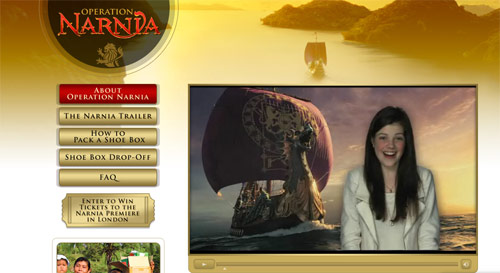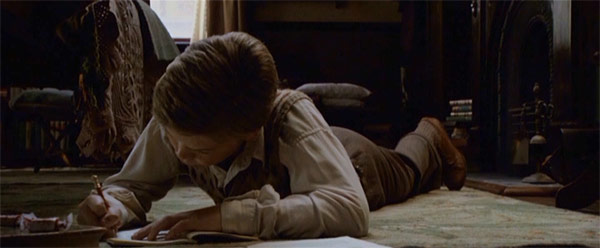
 Our good friend Douglas Gresham was recently in New York City for a performance of the play The Screwtape Letters. He stayed around afterward to lead a question and answer session, and also took part in a recorded interview that touches on The Voyage of the Dawn Treader, Tolkien and the Inklings, and the resonance of Lewis’ words today.
Our good friend Douglas Gresham was recently in New York City for a performance of the play The Screwtape Letters. He stayed around afterward to lead a question and answer session, and also took part in a recorded interview that touches on The Voyage of the Dawn Treader, Tolkien and the Inklings, and the resonance of Lewis’ words today.
Max McLean, star of The Screwtape Letters play, hosts Douglas Gresham, son of C.S Lewis and Executive Producer of Voyage of the Dawn Treader the movie, for a Christian Post exclusive interview in New York City.
Their discussion ranges from the challenges of writing and acting from Satan’s perspective in The Screwtape Letters, to an inside look at the upcoming release of Voyage of the Dawn Treader, to Lewis’ interaction with Tolkien and the Inklings literary group, to the impact Lewis’ words still carry today.
Video production for the interview provided by Goodnewsline, megachurch sermon streaming website.
Mr. Gresham talks about the theme of temptation that is present in the film, as well as his role of protecting the meaning of the books as translated to the screen. He mentions that each of the main characters confronts temptation in the film, and how they deal with it is the important thing. He says that it is a beautiful and moving film with scenes that are very emotional.
MithLuin took the time to transcribe the part of the video that is relevant to The Voyage of the Dawn Treader:
Interviewer: How did your personal relationship with him inform the work you are doing as a producer of the Narnia films?
Douglas Gresham: Completely and totally is the easiest answer to that. Everything that I do in trying to make sure that the messages that Jack was building into the books he wrote always reach the screen all comes from a direct liaison with Jack, from knowing exactly how he thought, and knowing what he wanted in his books to say. He realized, as many people did, that we really needed to get back to the nineteenth century concepts of honor and duty and personal responsibility, personal commitment to chivalry and all of those things that we threw away in the twentieth century on the grounds that they were somehow out of date. Well, they aren’t, they’re eternal, and we need to get them back. Having thrown them away in the twentieth century, we’ve had to watch all of our society crumble around us into ruins, which is happening faster and faster. So we need to get those things back, and it’s my duty, I believe, my inherited duty, to make sure they play as prominent a part in the movie as possible, in every movie we make, as much as it’s possible to achieve. Of course, the books are not written as film scripts, so they have to be changed, certain changes have to be made, and I work very hard with my colleagues to try to make sure that any change made is one that is needed, and that it works for the sake of the film, and yet that the film will still carry the important essence that Jack built into those books. You will find that the essence of Voyage of the Dawn-treader is…. Dawn Treader is Screwtape for kids, in a sense – it’s all about temptation, how it afflicts you and what you can do about it. And that’s all still very strongly in the movie, and you’ll see it, you’ll see them being tempted one after the other, and how they cope with it, where they fail and where they succeed. So all of these things are very important to me. I think I inherited a moral responsibility to look after these things.
Interviewer: What can people expect in the upcoming movie?
Douglas Gresham: Well, that’s a difficult question! I don’t want to give too much away. A lot of excitement. A great deal of beauty. I have to say that Michael Apted and Dante Spinotti, our DP [Director of Photography], have filmed it absolutely magnificently…there are such beautiful scenes in it. Also, there are some very, very emotionally moving scenes in this film. There is a great deal of easy to understand scenes of temptation – different people get tempted in different ways, in different places – tempted to fear, tempted to greed, tempted to this or that or the other thing. The instructional part of this is how you can cope with this or win through it. One of the problems we have with temptation today is everyone believes it is impossible to defeat. And you can never really know how strong temptation is until you have defeated it. If you just give in, all you’ve discovered is the level of your own weakness, not how strong the temptation can become. If you want to know how strong Mike Tyson is, you have to get into the ring and beat him – and that’s tough.
Max McLean: That’s a good analogy.
Douglas Gresham: That’s the case, though, really. This comes out, I think you’ll find, in the movie – you cannot know how strong these temptations can be until you actually fight them and defeat them. Some of our heroes and heroines come pretty close to the edge at times in this movie. I think you’ll find it’s going to be a beautiful and exciting film.
Big thanks to MithLuin for transcribing this!




I love what Max and Douglas both said about trusting the text and not being able to go wrong when you stick to the original words. 😉 Wish the script writers would remember that more! I think it would be fun to sit in a theater with a bunch of other Narnia fans who have read the books zillions of times and be able to say the lines along with the characters! 🙂
If you watched the whole thing you’ll also have noted that he’s protecting the meaning that Lewis intended for the books first and foremost. Lewis wasn’t a screenwriter and while something might read well in our heads, sometimes on screen it doesn’t make much sense or needs more words (or less) to get the same point across. One thing to keep in mind is that the screenwriters are adapting books with a constant narrative voice. That voice has to be translated to the screen as well. You’ll likely hear me say again and again this year (as it’s come up for any and all movies based on books): Movies and Books are different mediums that require different storytelling choices. As a prime example of some of the difficulty, check out the behind the scenes on the Lord of the Rings Extended Editions. Peter Jackson talks about how, had they translated them word for word, there were things that happened simultaneously with other characters in other parts of middle earth, but you didn’t read about it until much later. They had to figure out how to make things happen chronologically without diffusing the sense of danger that you had as a reader that didn’t know what had actually happened. That’s one of the many struggles that screenwriters go through. And believe me when I say: the Narnia writers go through the books with a fine-toothed comb, seeking out things that they can take away from passages and then asking someone like Douglas Gresham what Lewis might have actually meant in this passage or that. And I also heard one actor in particular wanted to know the origin of the name of his character for this film, so that he would better know how to play the role.
I wasn’t able to watch the whole thing. I tried 3 times, but it kept on stopping between the 7th and 8th minute and never starting again.
I know it is not possible to do the Narnia movies with 99% word accuracy the way they did the Screwtape play, but what I would like to see is more direct quotes. Some parts of LWW and PC, especially Aslan’s lines, were “messed with”, in my mind unnecessarily. I don’t expect the whole movie to be verbatim, but there are some truly memorable lines that shouldn’t be tampered with. LWW did the best job with this–Tumnus’ and the Professor’s lines come immediately to mind–while PC disappointed the most–the dialogue between Lucy and Aslan primarily, though the scene was shot particularly well and there didn’t seem to be any obvious plot reason for changing them. I’d love to be more specific, but once I read the book I forget what the line was in the movie and I’d have to watch the movie to find out. 😉 Needless to say, there are some AWESOME lines in Voyage that I REALLY want to hear on screen and if I don’t I will probably want to make a list and chat about it on the forums. But since I’ll have a 3 month old at that point, somehow I doubt that will happen. 😉
Thank you very much, Paul, for the clarification. Those are the things I like to hear… It’s good to have the assurance that the filmmakers are doing their best to be faithful to Lewis’ original ideas. We fans of the movies (and the books) need to bear in mind the difficulty of crossing from one medium to another!
I am so glad I inadvertantly came across this interview, less for the “director’s take” on the movie, and more to hear how God is working, specifically through the hardships Lewis and he faced, through the play to reach a particular audience member with a particular line, through the meanings woven through the Narnia stories, through the hand of God in McLean and Gresham’s own lives. And, of course, hearing Lewis come to life in Gresham’s affections was a major plus.
I loved watching this interview. It gave me more of an insight on not only Narnia, but other works that C.S. Lewis has written and Lewis himself from someone who knew him personally. I love that they will be taking that theme of temptation and putting it in the movie because it is a big issue in today’s world, a very different one than the world that Lewis lived in, and yet he is able to address it perfectly. I personally have not read the Screwtape Letters before (insert mocking here) but after seeing this interview, I am more encouraged to have a go at it. And I like how he didn’t reveal too much about the film. How dissappointng would it be if you knew basically everything there is to know, and then going and seeing it, and there isn’t that little magic there because you’re focused on the details you learned before and not on the story itself? There would be no element of surprise, and I think that is important with any movie, especially a movie like this, when seeing it for the first time. It’s nice to be surprised, wonderful even, and I thank Mr. Gresham for helping to keep that element of surprise there. Thanks for listening!
Agreed, majorly. I watched through the end, and also must thank you for putting this up. It does make me want to take a peek at the book, but more so it gave more information on C.S.Lewis, Dawn Treader, and even his other works. Temptation will be a big thing? Dawn Treader being ‘Screwtape letters for children’… Now that is something that sounds quite interesting (in a good way). Thanks again for posting this! I love listening to Douglas Gresham. =D.
Paul,
Is there any way you or someone else could transcribe this video for us? I’m having a really hard time playing it, it keeps pausing and won’t go through…. and from the comments above it sounds like some other people are having difficulties watching it too.
Thanks!
The video is about 25 minutes in length, so transcribing it would take a great deal of time. Unless a bunch of people wanted to do it together, each taking a few minutes. We could set up a Google Doc to collaborate on it, though.
I finally got it to work… 🙂
I think the trick is to push play, then once it’s loaded push pause, and walk away for about 10-15 minutes to give it time to load completely.
The part that I’m struggling with on VDT is that Susan and Peter are in the movie…they aren’t in the book…they don’t reappear until the Horse and His Boy. They aren’t in the Silver Chair or the Magician’s Nephew and Peter is the only one of the two to appear in The Last Battle. I’m curious as to what “the deal is” with their appearence in VDT…I hope they aren’t merging any of the books.
I sincerely hope Fox and Walde will continue and make movies out of the remaining 4 books.
They are in the book. If you re-read it, you’ll see.
They’re in the very beginnning of the book, but only mentioned. Susan gets a cameo too.
I’ve transcribed the part that is relevant to the movie (18 min. into the video). Please excuse any errors.
Interviewer: How did your personal relationship with him inform the work you are doing as a producer of the Narnia films?
Gresham: Completely and totally is the easiest answer to that. Everything that I do in trying to make sure that the messages that Jack was building into the books he wrote always reach the screen all comes from a direct liaison with Jack, from knowing exactly how he thought, and knowing what he wanted in his books to say. He realized, as many people did, that we really needed to get back to the nineteenth century concepts of honor and duty and personal responsibility, personal commitment to chivalry and all of those things that we threw away in the twentieth century on the grounds that they were somehow out of date. Well, they aren’t, they’re eternal, and we need to get them back. Having thrown them away in the twentieth century, we’ve had to watch all of our society crumble around us into ruins, which is happening faster and faster. So we need to get those things back, and it’s my duty, I believe, my inherited duty, to make sure they play as prominent a part in the movie as possible, in every movie we make, as much as it’s possible to achieve. Of course, the books are not written as film scripts, so they have to be changed, certain changes have to be made, and I work very hard with my colleagues to try to make sure that any change made is one that is needed, and that it works for the sake of the film, and yet that the film will still carry the important essence that Jack built into those books. You will find that the essence of Voyage of the Dawn-treader is…. Dawn Treader is Screwtape for kids, in a sense – it’s all about temptation, how it afflicts you and what you can do about it. And that’s all still very strongly in the movie, and you’ll see it, you’ll see them being tempted one after the other, and how they cope with it, where they fail and where they succeed. So all of these things are very important to me. I think I inherited a moral responsibility to look after these things.
Interviewer: What can people expect in the upcoming movie?
Gresham: Well, that’s a difficult question! I don’t want to give too much away. A lot of excitement. A great deal of beauty. I have to say that Michael Apted and (Dante Spinotti?) our DP have filmed it absolutely magnificently…there are such beautiful scenes in it. Also, there are some very, very emotionally moving scenes in this film. There is a great deal of easy to understand scenes of temptation – different people get tempted in different ways, in different places – tempted to fear, tempted to greed, tempted to this or that or the other thing. The instructional part of this is how you can cope with this or win through it. One of the problems we have with temptation today is everyone believes it is impossible to defeat. And you can never really know how strong temptation is until you have defeated it. If you just give in, all you’ve discovered is the level of your own weakness, not how strong the temptation can become. If you want to know how strong Mike Tyson is, you have to get into the ring and beat him – and that’s tough.
Max McLean: That’s a good analogy.
Gresham: That’s the case, though, really. This comes out, I think you’ll find, in the movie – you cannot know how strong these temptations can be until you actually fight them and defeat them. Some of our heroes and heroines come pretty close to the edge at times in this movie. I think you’ll find it’s going to be a beautiful and exciting film.